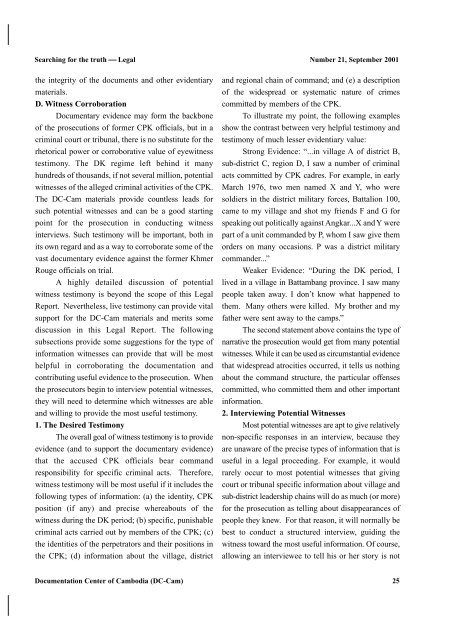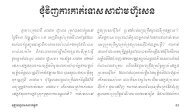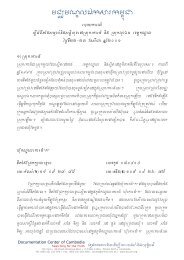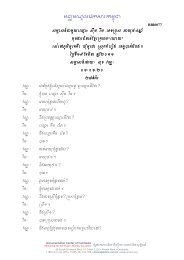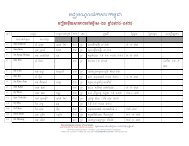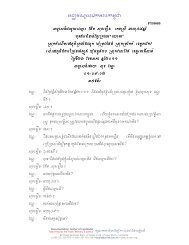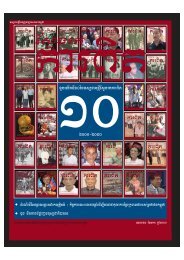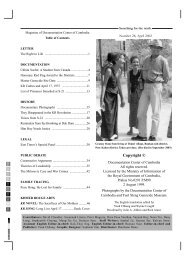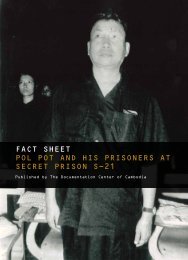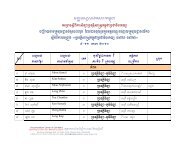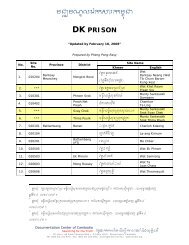Searching for the truth Issues 21 - Documentation Center of Cambodia
Searching for the truth Issues 21 - Documentation Center of Cambodia
Searching for the truth Issues 21 - Documentation Center of Cambodia
Create successful ePaper yourself
Turn your PDF publications into a flip-book with our unique Google optimized e-Paper software.
<strong>Searching</strong> <strong>for</strong> <strong>the</strong> <strong>truth</strong> ⎯ Legal<br />
<strong>the</strong> integrity <strong>of</strong> <strong>the</strong> documents and o<strong>the</strong>r evidentiary<br />
materials.<br />
D. Witness Corroboration<br />
Documentary evidence may <strong>for</strong>m <strong>the</strong> backbone<br />
<strong>of</strong> <strong>the</strong> prosecutions <strong>of</strong> <strong>for</strong>mer CPK <strong>of</strong>ficials, but in a<br />
criminal court or tribunal, <strong>the</strong>re is no substitute <strong>for</strong> <strong>the</strong><br />
rhetorical power or corroborative value <strong>of</strong> eyewitness<br />
testimony. The DK regime left behind it many<br />
hundreds <strong>of</strong> thousands, if not several million, potential<br />
witnesses <strong>of</strong> <strong>the</strong> alleged criminal activities <strong>of</strong> <strong>the</strong> CPK.<br />
The DC-Cam materials provide countless leads <strong>for</strong><br />
such potential witnesses and can be a good starting<br />
point <strong>for</strong> <strong>the</strong> prosecution in conducting witness<br />
interviews. Such testimony will be important, both in<br />
its own regard and as a way to corroborate some <strong>of</strong> <strong>the</strong><br />
vast documentary evidence against <strong>the</strong> <strong>for</strong>mer Khmer<br />
Rouge <strong>of</strong>ficials on trial.<br />
A highly detailed discussion <strong>of</strong> potential<br />
witness testimony is beyond <strong>the</strong> scope <strong>of</strong> this Legal<br />
Report. Never<strong>the</strong>less, live testimony can provide vital<br />
support <strong>for</strong> <strong>the</strong> DC-Cam materials and merits some<br />
discussion in this Legal Report. The following<br />
subsections provide some suggestions <strong>for</strong> <strong>the</strong> type <strong>of</strong><br />
in<strong>for</strong>mation witnesses can provide that will be most<br />
helpful in corroborating <strong>the</strong> documentation and<br />
contributing useful evidence to <strong>the</strong> prosecution. When<br />
<strong>the</strong> prosecutors begin to interview potential witnesses,<br />
<strong>the</strong>y will need to determine which witnesses are able<br />
and willing to provide <strong>the</strong> most useful testimony.<br />
1. The Desired Testimony<br />
The overall goal <strong>of</strong> witness testimony is to provide<br />
evidence (and to support <strong>the</strong> documentary evidence)<br />
that <strong>the</strong> accused CPK <strong>of</strong>ficials bear command<br />
responsibility <strong>for</strong> specific criminal acts. There<strong>for</strong>e,<br />
witness testimony will be most useful if it includes <strong>the</strong><br />
following types <strong>of</strong> in<strong>for</strong>mation: (a) <strong>the</strong> identity, CPK<br />
position (if any) and precise whereabouts <strong>of</strong> <strong>the</strong><br />
witness during <strong>the</strong> DK period; (b) specific, punishable<br />
criminal acts carried out by members <strong>of</strong> <strong>the</strong> CPK; (c)<br />
<strong>the</strong> identities <strong>of</strong> <strong>the</strong> perpetrators and <strong>the</strong>ir positions in<br />
<strong>the</strong> CPK; (d) in<strong>for</strong>mation about <strong>the</strong> village, district<br />
<strong>Documentation</strong> <strong>Center</strong> <strong>of</strong> <strong>Cambodia</strong> (DC-Cam)<br />
Number <strong>21</strong>, September 2001<br />
and regional chain <strong>of</strong> command; and (e) a description<br />
<strong>of</strong> <strong>the</strong> widespread or systematic nature <strong>of</strong> crimes<br />
committed by members <strong>of</strong> <strong>the</strong> CPK.<br />
To illustrate my point, <strong>the</strong> following examples<br />
show <strong>the</strong> contrast between very helpful testimony and<br />
testimony <strong>of</strong> much lesser evidentiary value:<br />
Strong Evidence: “...in village A <strong>of</strong> district B,<br />
sub-district C, region D, I saw a number <strong>of</strong> criminal<br />
acts committed by CPK cadres. For example, in early<br />
March 1976, two men named X and Y, who were<br />
soldiers in <strong>the</strong> district military <strong>for</strong>ces, Battalion 100,<br />
came to my village and shot my friends F and G <strong>for</strong><br />
speaking out politically against Angkar...X and Y were<br />
part <strong>of</strong> a unit commanded by P, whom I saw give <strong>the</strong>m<br />
orders on many occasions. P was a district military<br />
commander...”<br />
Weaker Evidence: “During <strong>the</strong> DK period, I<br />
lived in a village in Battambang province. I saw many<br />
people taken away. I don’t know what happened to<br />
<strong>the</strong>m. Many o<strong>the</strong>rs were killed. My bro<strong>the</strong>r and my<br />
fa<strong>the</strong>r were sent away to <strong>the</strong> camps.”<br />
The second statement above contains <strong>the</strong> type <strong>of</strong><br />
narrative <strong>the</strong> prosecution would get from many potential<br />
witnesses. While it can be used as circumstantial evidence<br />
that widespread atrocities occurred, it tells us nothing<br />
about <strong>the</strong> command structure, <strong>the</strong> particular <strong>of</strong>fenses<br />
committed, who committed <strong>the</strong>m and o<strong>the</strong>r important<br />
in<strong>for</strong>mation.<br />
2. Interviewing Potential Witnesses<br />
Most potential witnesses are apt to give relatively<br />
non-specific responses in an interview, because <strong>the</strong>y<br />
are unaware <strong>of</strong> <strong>the</strong> precise types <strong>of</strong> in<strong>for</strong>mation that is<br />
useful in a legal proceeding. For example, it would<br />
rarely occur to most potential witnesses that giving<br />
court or tribunal specific in<strong>for</strong>mation about village and<br />
sub-district leadership chains will do as much (or more)<br />
<strong>for</strong> <strong>the</strong> prosecution as telling about disappearances <strong>of</strong><br />
people <strong>the</strong>y knew. For that reason, it will normally be<br />
best to conduct a structured interview, guiding <strong>the</strong><br />
witness toward <strong>the</strong> most useful in<strong>for</strong>mation. Of course,<br />
allowing an interviewee to tell his or her story is not<br />
25


